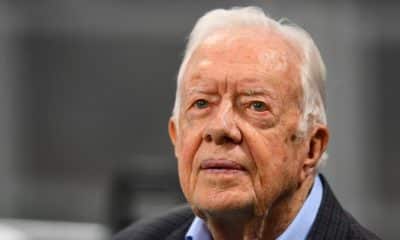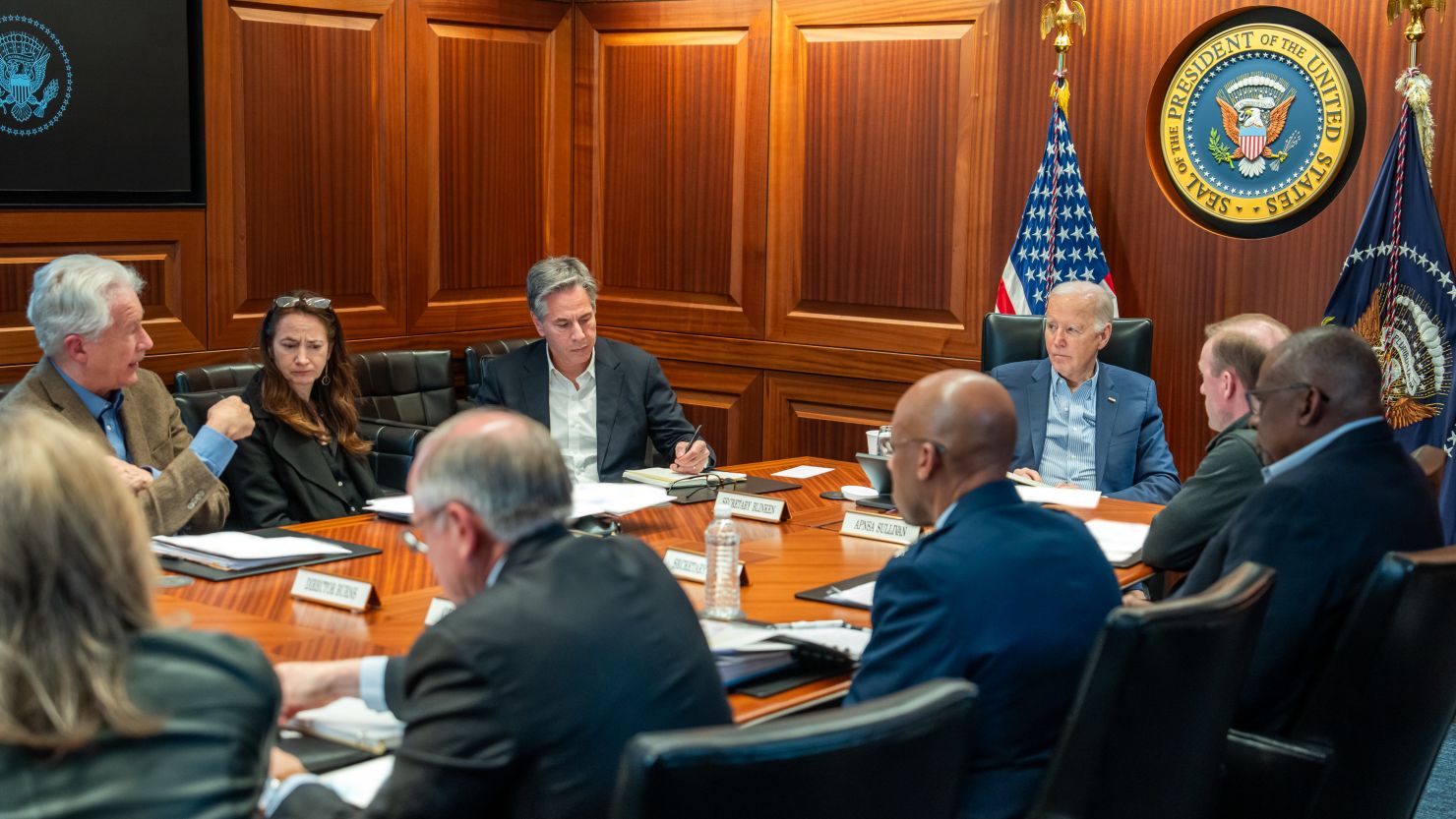Politics
Jimmy Carter, 39th US President, Enters Hospice Care At Home
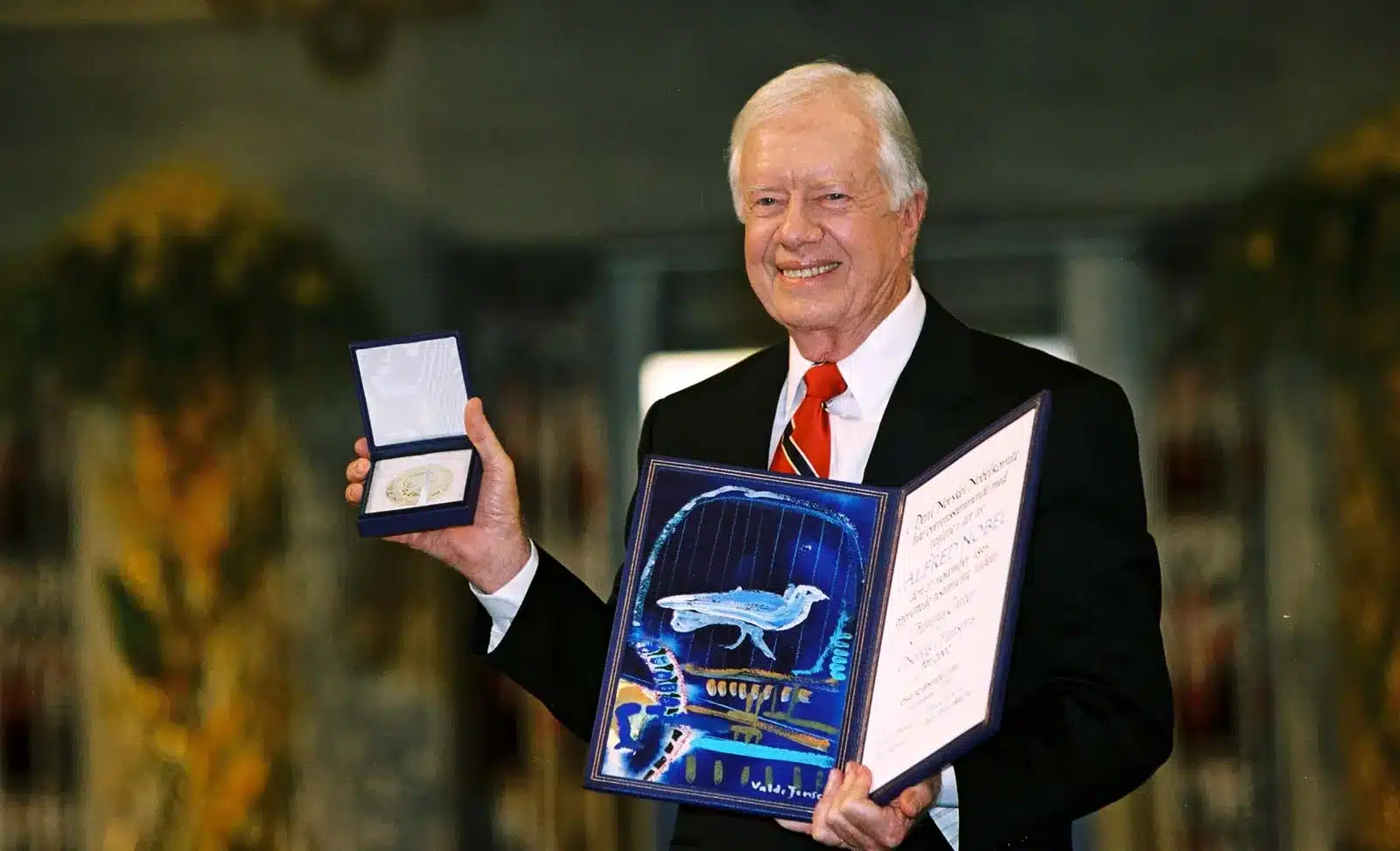
ATLANTA, Ga. — Former President Jimmy Carter, the longest-living American president at 98 years old, has entered home hospice care in Plains, Georgia, according to a statement from The Carter Center on Saturday.
Carter “decided to spend his remaining time at home with his family and receive hospice care instead of additional medical intervention” after a series of short hospital stays, according to the statement.
The 39th president has the full support of his medical team and family, who “ask for privacy at this time and are grateful for the concern shown by his many admirers,” according to the statement.
Jimmy Carter was a little-known Georgia governor when he launched his presidential campaign ahead of the 1976 election. He went on to defeat then-President Gerald R. Ford, capitalizing on his status as a Washington outsider in the aftermath of the Vietnam War and the Watergate scandal, which forced Richard Nixon out of office in 1974.
Jimmy Carter served a single turbulent term before being defeated by Republican Ronald Reagan in 1980, paving the way for his decades of global advocacy for democracy, public health, and human rights through The Carter Center.
The Center was founded in 1982 by the former president and his wife, Rosalynn, 95. In 2002, his work there earned him the Nobel Peace Prize.
Jimmy Carter, Who Spent Most Of His Life In the Plains
Jason Carter, the couple’s grandson who now chairs The Carter Center’s governing board, tweeted on Saturday that he “saw both of my grandparents yesterday. They are at peace, and their home is full of love, as always.”
Jimmy Carter, who spent most of his life in the Plains, traveled extensively into his 80s and early 90s, including annual trips to Habitat for Humanity and frequent trips abroad as part of the Carter Center’s election monitoring and efforts to eradicate the Guinea worm parasite in developing countries. However, the former president’s health has deteriorated in his tenth decade, particularly as the coronavirus pandemic has limited his public appearances, including at his beloved Maranatha Baptist Church, where he taught Sunday School lessons for decades to standing-room-only crowds.
Former President Jimmy Carter is receiving hospice care at the Carter Center.
Carter had a small cancerous mass removed from his liver in August 2015. Carter said the next year that he didn’t need any more treatment because an experimental drug had taken care of all the cancer.
Carter’s most recent birthday was celebrated in October with family and friends in Plains, the small town where he and Rosalynn were born between World War I and the Great Depression.
Last year, the Carter Center celebrated 40 years of promoting its human rights agenda.
Jimmy Carter Was Born In Rural South Georgia
Since 1989, the Center has been a leader in the field of election observation. At least 113 elections in Africa, Latin America, and Asia have been watched by the Center. The organization recently said that there were only 14 cases of Guinea worm disease in humans in all of 2021. This is the result of years of public health campaigns in Africa to make it easier for people to get clean drinking water.
This is a dramatic reduction from when The Carter Center took the lead on global eradication efforts in 1986 when the parasitic disease infected 3.5 million people. Carter once stated that he hoped to outlive the last Guinea worm parasite.
Carter was born in rural south Georgia on October 1, 1924, to a prominent family. During WWII, he attended the United States Naval Academy and served as a Cold War Naval officer before returning to Plains, Georgia, with Rosalynn and their young family to take over the peanut business after Earl Carter’s death in the 1950s.
The younger Carter, a moderate Democrat, rose quickly from the local school board to the state Senate and then to the governorship of Georgia. He launched his presidential campaign as an underdog with a broad smile, outspoken Baptist beliefs, and policy proposals that reflected his engineering education. He was popular among many Americans because he promised not to deceive the American people following Nixon’s disgrace and defeat in Southeast Asia.
“Don’t vote for me if I lie or make a false statement. “I would not deserve to be your president,” Carter frequently said during his campaign.
Jimmy Carter, who came of age politically during the civil rights movement, was the last Democratic presidential nominee to sweep the Deep South before Reagan and the Republicans swept the region in subsequent elections.
He governed amid Cold War tensions, volatile oil markets, social unrest over racism, women’s rights, and America’s global role.
At 100 Years Old, The Man Is Still An Active Volunteer
Jimmy Carter’s foreign policy triumphs included keeping Egyptian President Anwar Sadat, and Israeli Prime Minister Menachem Begin at the negotiating table for 13 days in 1978. That Camp David experience inspired the post-presidential Center where Carter would leave his imprint. Domestically, Jimmy Carter deregulated the airline, railroad, and trucking industries and established the departments of Education and Energy and the Federal Emergency Management Agency. He established national parks and wildlife refuges on millions of acres in Alaska. He appointed a record number of women and non-whites to federal positions. He never received a Supreme Court nomination, but he did appoint civil rights lawyer Ruth Bader Ginsburg to the nation’s ≥second-highest court, putting her in line for a promotion in 1993.
Jimmy Carter also expanded on Nixon’s opening to China, and while tolerating autocrats in Asia, he pushed Latin America away from dictatorships and toward democracy.
Despite this, Jimmy Carter’s electoral coalition splintered due to double-digit inflation, gasoline lines, and Iran’s 444-day hostage crisis. In April 1980, eight Americans were killed in a failed hostage rescue, contributing to his landslide defeat.
Jimmy Carter largely disappeared from electoral politics in the years following his defeat. Democrats were wary of embracing him. Republicans used him as a punchline, portraying him as a helpless liberal. In reality, Jimmy Carter governed as a technocrat, more progressive on race and gender equality than he had campaigned, but a budget hawk who frequently irritated more liberal Democrats, including Ted Kennedy, the Massachusetts senator who ran a damaging primary campaign against the sitting president in 1980.
Carter said after he left office that he had underestimated how important it was to deal with Washington power brokers, such as the media and lobbying groups in the nation’s capital. However, he insisted that his overall strategy was sound and that he had achieved his primary goals — to “protect our nation’s security and interests peacefully” and “enhance human rights here and abroad” — despite falling dramatically short of a second term.
Years later, when he was 100 and was told he had cancer, he said he was happy with his long life.
“I’m perfectly fine with whatever happens,” he said in 2015. “I’ve had an exciting, adventurous, and rewarding life.”
SOURCE – (AP)
Celebrity
Potential Jurors Called Into Courtroom For Start Of Trump’s Historic Hush-Money Trial

NEW YORK — The historic hush-money trial of Donald Trump began Monday, with scores of prospective jurors crammed into a courtroom where the former president will face allegations that he fabricated business records to suppress revelations about his sex life.
The first criminal prosecution of any former US president will take place as Trump seeks to recover the White House, producing a fascinating split-screen spectacle in which the probable Republican nominee spends his days as a criminal defendant while also campaigning for government. Over the last year, he has combined both roles by portraying himself to supporters on the campaign road and social media as the object of politically motivated prosecutions intended to destroy his candidacy.
Potential Jurors Called Into Courtroom For Start Of Trump’s Historic Hush-Money Trial
After a norm-breaking presidency shadowed by years of investigations, Trump’s trial is a legal reckoning. Four indictments accuse him of crimes ranging from hoarding confidential data to attempting to overthrow an election. However, the political stakes are less obvious because a conviction would not prevent him from becoming president, and the charges, in this case, reach back years and are viewed as less serious than the conduct behind the other three indictments.
The day began with hours of pretrial arguments, including potential penalties for Trump before jury selection began Monday afternoon. The first members of the jury pool, 96 in total, were summoned to the courtroom, where the parties would select who among them would be chosen to decide the legal fate of the former, and possibly future, American president.
Trump craned his neck to glance back at the pool, talking to his lawyer as they entered the jury box.
“You are about to stand trial by jury. Judge Juan Merchan told the jurors that the jury trial system is one of the pillars of our legal system. “The name of this case is the People of the State of New York vs. Donald Trump.”
Trump’s notoriety would make selecting 12 jurors and six alternates a near-herculean task in any year, but it’s likely to be especially difficult now, as the election takes place in the heavily Democratic city where Trump grew up and rose to celebrity status decades before winning the presidency.
Merchan has said that the question is “whether the prospective juror can assure us that they will set aside any personal feelings or biases and render a decision that is based on the evidence and the law.”
Regardless of the verdict, Trump is determined to gain from the proceedings, portraying the case and his other indictments as a broad “weaponization of law enforcement” by Democratic prosecutors and authorities. He claims they are staging bogus allegations to derail his presidential campaign. He’s been criticizing judges and prosecutors for years, a pattern of attacks that persisted until Monday, when he entered court and declared, “This is political persecution.” “This is a new kind of persecution.”
Earlier Monday, the judge dismissed a defense request to disqualify himself from the case after Trump’s lawyers alleged a conflict of interest. He also stated that the prosecution could not show the jury the 2005 “Access Hollywood” recording in which Trump was caught describing sexually assaulting women without their permission. However, prosecutors will be able to interrogate witnesses about the recording made public in the last weeks of the 2016 campaign.
Prosecutors from the Manhattan district attorney’s office also urged Merchan on Monday to pay Trump $3,000 for social media statements that they said breached the judge’s gag order prohibiting him from assaulting witnesses. Last week, he used his Truth Social platform to label his former lawyer, Michael Cohen and adult film actress Stormy Daniels, “two sleaze bags who have, with their lies and misrepresentations, cost our country dearly!”
Trump’s lawyer, Todd Blanche, contended that Trump was only responding to the witnesses’ comments.
“It’s not like President Trump is going out and targeting people. “He is responding to these witnesses’ salacious, repeated, vehement attacks,” Blanche stated.
Merchan did not rule out the request immediately but scheduled a hearing for next week.
Potential Jurors Called Into Courtroom For Start Of Trump’s Historic Hush-Money Trial
Trump has pleaded not guilty to 34 felony charges of falsifying company documents. Prosecutors believe the alleged fraud was part of an effort to prevent scandalous — and, Trump claims, false — tales about his personal life from surfacing during his 2016 campaign.
The allegations are based on $130,000 in payments made by Trump’s firm to Cohen. He paid that cash on Trump’s behalf a month before the election to prevent Daniels from going public with her claims of a sexual encounter with the married mogul a decade ago.
Prosecutors claim the payments to Cohen were falsely recorded as legal expenses to conceal their true purpose. Trump’s lawyers claim the disbursements were legal expenditures, not a cover-up.
After decades of fielding and bringing lawsuits, the businessman-turned-politician now faces a trial that may result in up to four years in prison if convicted, while a non-jail sentence is also an option. Trump is also expected to appeal any conviction.
Trump’s lawyers lost their quest to dismiss the hush-money case and have subsequently attempted to postpone it, resulting in a frenzy of last-minute appeals court proceedings last week.
Among other things, Trump’s attorneys argue that the jury pool in largely Democratic Manhattan has been corrupted by bad news about Trump and that the case should be transferred elsewhere.
An appeals judge denied an emergency motion to delay the trial, and a group of appellate judges will consider the change-of-venue request in the coming weeks.
Manhattan prosecutors have replied that most of the publicity derives from Trump’s words and that questioning will reveal whether prospective jurors can overcome their preconceived notions. They claim there is no reason to believe that 12 fair and impartial people cannot be identified among Manhattan’s roughly 1.4 million adult citizens.
The prospective jurors will only be identified by number since the judge has ordered that their names be kept secret from everyone save prosecutors, Trump, and their legal teams. The 42 preapproved, sometimes multi-pronged queries cover the basics while reflecting the case’s individuality.
Potential Jurors Called Into Courtroom For Start Of Trump’s Historic Hush-Money Trial
“Do you have any strong opinions or firmly held beliefs about former President Donald Trump, or the fact that he is a current candidate for president, that would interfere with your ability to be a fair and impartial juror?” asks a single inquiry.
Others inquire about attendance at Trump or anti-Trump rallies, opinions on how he is being treated in the case, news sources, and other factors — including any “political, moral, intellectual, or religious beliefs or opinions” that may “slant” a prospective juror’s attitude to the case.
Based on the responses, the attorneys can request that a court remove persons “for cause” if they fulfill certain criteria for being unfit to serve or impartial. The lawyers can also use “peremptory challenges” to dismiss 10 potential jurors and two prospective alternates without explaining.
“If you strike everybody who’s either a Republican or a Democrat,” the judge noted at a February hearing, “you’re going to run out of peremptory challenges very quickly.”
SOURCE – (AP)
Politics
US Mainstream Media Pressures Biden to Debate Trump

On Sunday, twelve news organizations asked expected presidential nominees Joe Biden and Donald Trump to consent to debates, calling them a “rich tradition” that has been part of every general election campaign since 1976.
While Trump, who did not participate in the Republican nomination debates, has shown a readiness to face his 2020 opponent, the Democratic president has not promised to debate him again.
Although no formal invitations have been issued, the news organizations stated that it is not too early for each campaign to openly announce its participation in the three presidential and one vice presidential forums scheduled by the independent Commission on Presidential Debates.
“If there is one thing Americans can agree on during this polarized time, it is that the stakes of this election are exceptionally high,” the organizations said in a joint statement. “Amidst that backdrop, there is simply no substitute for the candidates debating with each other, and before the American people, their visions for the future of our nation.”
ABC, CBS, CNN, Fox, PBS, NBC, NPR, and The Associated Press signed the letter.
Biden and Trump debated twice in 2020. A third debate was canceled after then-President Trump tested positive for COVID-19 and refused to debate remotely.
When asked on March 8 if he would agree to a debate with Trump, Biden replied, “It depends on his behavior.” The president was visibly irritated by his opponent during the freewheeling first 2020 debate, demanding, “Will you shut up?”

Republican presidential candidate Donald Trump wants to debate President Joe Biden – Photo Shutterstock.
Susie Wiles and Chris LaCivita, Trump campaign managers, stated in a letter last week that “we have already indicated President Trump is willing to debate anytime, any place, and anywhere—and the time to start these debates is now.”
They referenced Abraham Lincoln and Stephen Douglas’ seven 1858 Illinois Senate debates, stating, “Certainly, today’s America deserves as much.”
In 2022, the Republican National Committee voted not to participate in Commission on Presidential Debates-sponsored forums. The Trump team has not indicated that it will follow through on that, but it has set some conditions.
The campaign managers stated that in 2020, the commission chose a “demonstrably anti-Trump moderator” in then-Fox News presenter Chris Wallace, and they want assurances that the commission debates will be fair and impartial.
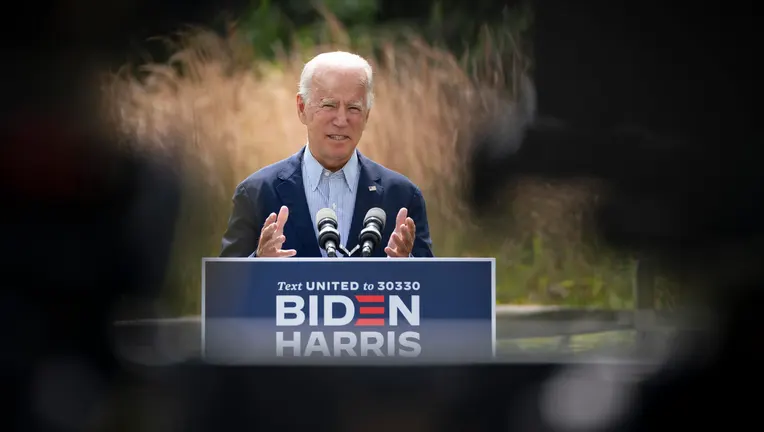
On Wednesday, a top Biden campaign official was noncommittal about President Joe Biden participating in the general election debates. – Shutterstock Photo
The Trump team also wants the timetable adjusted faster, claiming that many Americans will have voted by September 16, October 1, and October 9, the dates set by the commission for the three debates.
The Biden campaign declined to comment on the news organizations’ letter, citing the president’s previous statement. The Trump campaign did not immediately comment.
However, on Saturday, Trump hosted a rally in northeast Pennsylvania with two lecterns set up on stage: one for him to deliver a speech and the other to represent Biden’s unwillingness to debate him. The second podium included a banner that said, “Anytime. Anywhere. Anyplace.”
Midway into his campaign speech, Trump turned to the right and gestured to the second podium.
“We have a little, look at this, it’s for him,” he said. “Do you see the podium?” I’d want to challenge Crooked Joe Biden to a debate anytime and from anywhere. Right there. And we must debate because our country is headed in the wrong direction, and even though it is a little early, we must debate. “We must explain to the American people what the hell is going on,” Trump stated.
C-SPAN, NewsNation, and Univision also signed the letter demanding debates. Only one newspaper, USA Today, expressed its opinion. The Washington Post denied a request to participate.
Certainly, broadcasters may benefit from the buzz that discussions can generate. Television news ratings are down dramatically from the 2020 campaign. However, other variables, such as cord-cutting and the pandemic, contributed to increased interest in news four years ago.
There were no Democratic debates this election season, and Trump’s reluctance to participate in Republican forums reduced interest in them.
By Geoff Thomas
The Elites’ Hatred of Trump and Everyday Americans
News
Iran’s attack on Israel raises fears of a wider war, but all sides have also scored gains
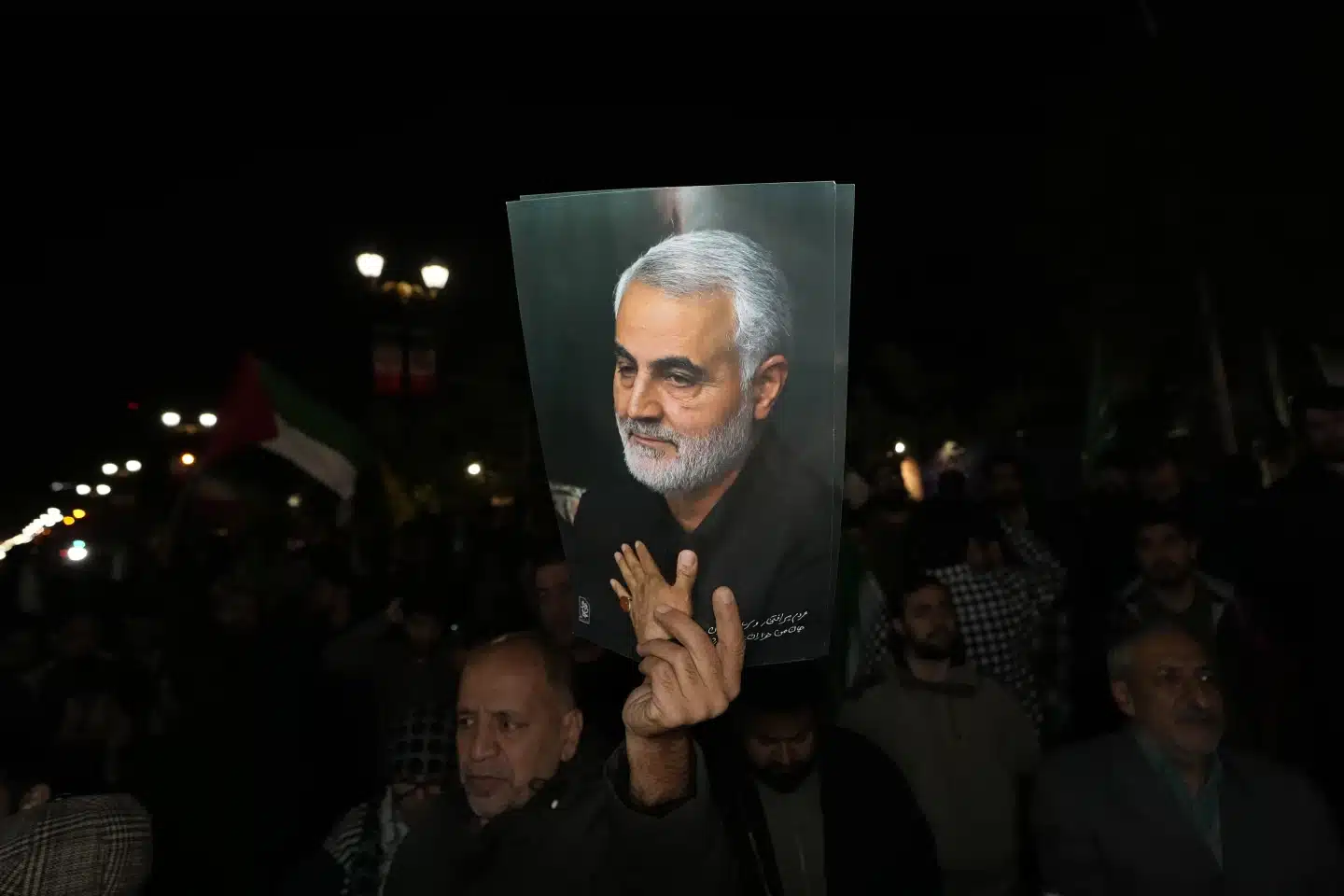
Tel Aviv, Israel – Iran’s extraordinary attack on Israel early Sunday heightened regional tensions, confirming long-held fears that the Israel-Hamas war will escalate into a larger conflagration. However, Iran, Israel, the US, and Hamas all made advances.
Here’s a peek at the aftermath.
As more than 300 drones and missiles approached in the early hours of Sunday, the country was able to effectively test its aerial defense system, which, with assistance from partners, stopped 99% of the projectiles and avoided serious damage.
Iran’s attack on Israel raises fears of a wider war, but all sides have also scored gains
In contrast, when Hamas rushed from Gaza into Israel on October 7, armed forces suffered a crushing defeat at the hands of a significantly less equipped enemy. That dealt a significant blow to Israel’s image as a regional military force, shattering any illusions of invincibility. The response to Iran’s attack could be what restores faith in the country’s military, even though its forces are still trapped in Gaza more than six months after Israel started war on Hamas there.
The country has also boasted about the coalition of forces that helped it resist the Iranian attack. It’s a much-needed display of support at a time when Israel is most isolated due to worries over its actions during the conflict against Hamas, including a deteriorating humanitarian catastrophe and a staggering death toll in Gaza.
Iran repeatedly pledged to respond to a suspected strike on an Iranian diplomatic compound in Damascus on April 1, which killed two generals. Sunday’s assault allowed Iran to demonstrate to its populace that it will not stand by while its assets are targeted and that it meant business when it threatened retaliation.
With its strike, Iran was able to demonstrate its formidable weaponry, induce terror in some Israelis, and disrupt the lives of many through school closures. However, with little actual damage suffered in Israel, Iran may expect a restrained response. Iran announced the operation’s end several hours after the drones and missiles were launched.
Iran’s attack on Israel raises fears of a wider war, but all sides have also scored gains
The United States played a major role in repelling the onslaught, proving to its allies worldwide the strength and dependability of American backing.
Now, as the country considers how and if to respond, that partnership will be tested, the Biden administration will attempt to impose leverage on Israel and prevent it from carrying out a retaliation that could exacerbate the crisis.
Hamas, which Iran sponsors, hailed the attack on the country. Since beginning its October 7 offensive, Hamas had hoped that regional allies would rush to its aid and pull Israel into a larger conflict. While others have intervened, notably the Iranian-backed Hezbollah in Lebanon and Yemen’s Houthis, Iran did not directly enter the conflict until Sunday.
Iran’s attack on Israel raises fears of a wider war, but all sides have also scored gains
Hamas may believe that the attack is the first step toward greater Iranian involvement in the Gaza conflict. It might also hope that unrest in the West Bank, where a teenager was slain and settlers rampaged through Palestinian towns, continues to escalate. At the absolute least, Iran’s attack may have emboldened Hamas to dig in its heels in current cease-fire discussions, thinking that increased military pressure on them may persuade it to accept the militant group’s tougher criteria for an agreement.
SOURCE – (AP)
-
News5 months ago
Death Toll From Flooding In Somalia Climbs To Nearly 100
-
Business5 months ago
Google Will Start Deleting ‘Inactive’ Accounts In December. Here’s What You Need To Know
-
Entertainment5 months ago
Merriam-Webster’s 2023 Word Of The Year Is ‘Authentic’
-
Sports5 months ago
Panthers Fire Frank Reich In His First Season With Team Off To NFL-Worst 1-10 Record
-
Celebrity5 months ago
Elon Musk Visits Destroyed Kibbutz and Meets Netanyahu in Wake of Antisemitic Post
-
Celebrity5 months ago
Shane MacGowan, Lead Singer Of The Pogues And A Laureate Of Booze And Beauty, Dies At Age 65





